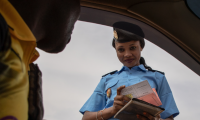Awareness of human rights among security forces is indispensable in the fight against terrorism

We have worked in Niger since 1997. In collaboration with Niger’s security forces, the Ministry of Justice and other state actors, we contribute to trust-building and the protection and promotion of human rights.
‘Police should only resort to physical force when all other options have been depleted. When they use physical force, they risk violating a person’s bodily integrity and basic human rights, such as the right to life.’
This text is part of a booklet focusing on human rights which every single police cadet in Niger is reading, while studying at the national police academy.
Like in Niger, all students in the neighbouring countries Mali and Burkina Faso who are studying to become either prison guards, water and forestry guards, gendarmes, national guards or police officers will receive human rights education and training. This means that the students at all these schools now have human rights pedagogical tools at their disposal together with an array of human rights trainers.
Since the first partnership in the region in 1999, ten internal security forces in Burkina Faso, Mali and Niger have fully integrated human rights standards and norms into their curricula.
In recent years, the number of terrorist attacks and the insecurity in the Sahel region in Africa have reached an unprecedented level.
Awareness of human rights among internal security forces is indispensable in the fight against terrorism, according to Christelle Zafiryadis, Department Director of the Human Rights, Africa Department, at the Danish Institute for Human Rights. That is why one of the key goals within these partnerships is to instil a culture of respect for human rights amongst internal security forces in order for them to understand and apply the tools designed for promote human rights and dialogue in local populations.
Our work in West Africa is funded by the EU Trust Fund Sahel and our framework agreement with Danida.
“Regardless of whether you control the borders between Mali and Burkina Faso, work as a guard in a prison in Niger or ensure law and order in the forests of Burkina Faso, it is key that you know and respect human rights. Internal security forces who don’t respect the rights of the inmates or the population in general are most likely not trusted”, says Christelle Zafiryadis.
When the security forces are combatting terrorism, they depend to a large extent on the support of the population.
If the citizens fear or distrust the security forces, they are reluctant to sharing information, for instance by reporting on terrorists’ hiding places or informing about people who are collaborating with terrorist groups.
Until recently, the Ivory Coast on the West African Coast has largely been free from the threat of the violent extremism which mars many of the neighbouring Sahel countries. However, in recent years, numerous terrorist groups have been threatening the country. Building on many years of collaboration between the Danish Institute for Human Rights and internal security forces on human rights in Burkina Faso, Mali and Niger, the Ivory Coast is now following in the footsteps of their neighbouring countries. With support from the Danish Institute for Human Rights, the National Human Rights Council in the Ivory Coast is currently planning how to improve trust between the population and the security forces by promoting human rights among the country’s security forces.
